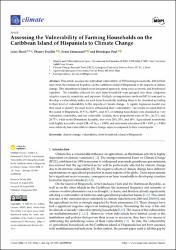/admin/item?itemID=cfe1b253-3ca9-4097-b4cc-0b787e1ca036
Assessing the vulnerability of farming households on the Caribbean island of Hispaniola to climate change

View/
Type of Access
OpenMaterial Type
ArticleType of Content
Scientific researchLanguage
EnglishCollection
- Investigación ambiental [1747]
Metadata
Show full item record| Abstract: | This article assesses the individual vulnerability of 550 farming households, 430 in Haiti and 120 in the Dominican Republic, on the Caribbean island of Hispaniola to the impacts of climate change. This assessment is based on an integrated approach, using socio-economic and biophysical variables. The variables collected for each farm household were grouped into three categories: adaptive capacity, sensitivity, and exposure. Multiple correspondence analysis (MCA) was used to develop a vulnerability index for each farm household, enabling them to be classified according to their level of vulnerability to the impacts of climate change. A logistic regression model was then used to identify the main factors influencing their vulnerability. The results revealed that on the island of Hispaniola, 33.91%, 32.09%, and 34% of farming households were classified as very vulnerable, vulnerable, and less vulnerable. In Haiti, these proportions were 36.74%, 36.51%, and 26.75%, while in the Dominican Republic, they were 20%, 20%, and 60%. Agricultural households with highly accessible credit (OR = 0.16, p < 0.001) and university education (OR = 0.05, p < 0.001) were relatively less vulnerable to climate change impacts compared to their counterparts. |
| Author(s): | Duvil, Jacky
Feuillet, Thierry Emmanuel, Evens Paul, Bénédique |
| Date: | 2024 |
| Published: | Climate, 12(9), 138 |
| Citation: | Duvil, J., Feuillet, T., Emmanuel, E., & Paul, B. (2024). Assessing the vulnerability of farming households on the Caribbean island of Hispaniola to climate change. Climate, 12(9), 138. Recuperado de: |
| URI: | https://bvearmb.do/handle/123456789/5138
|

